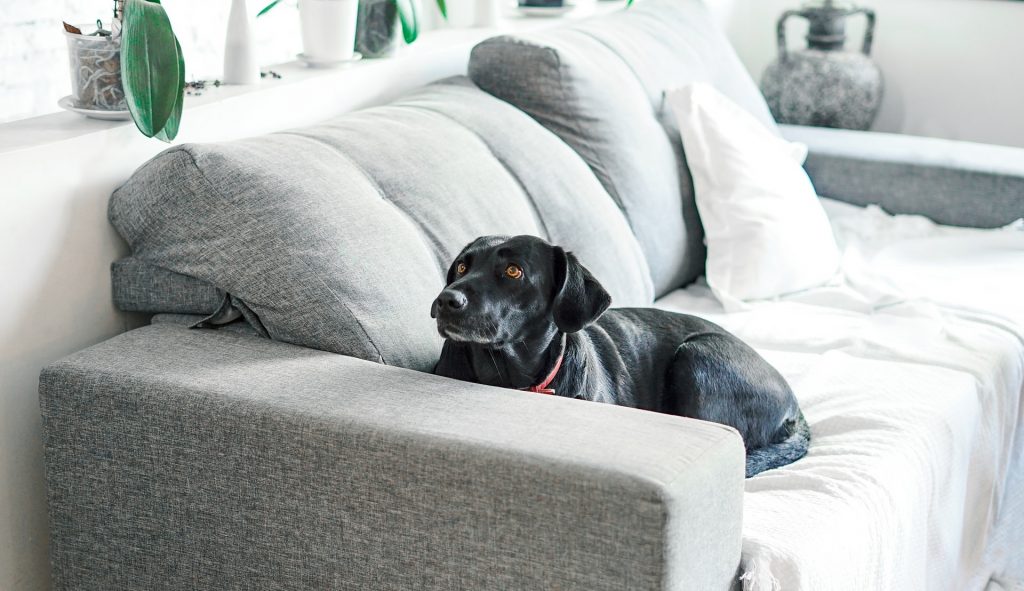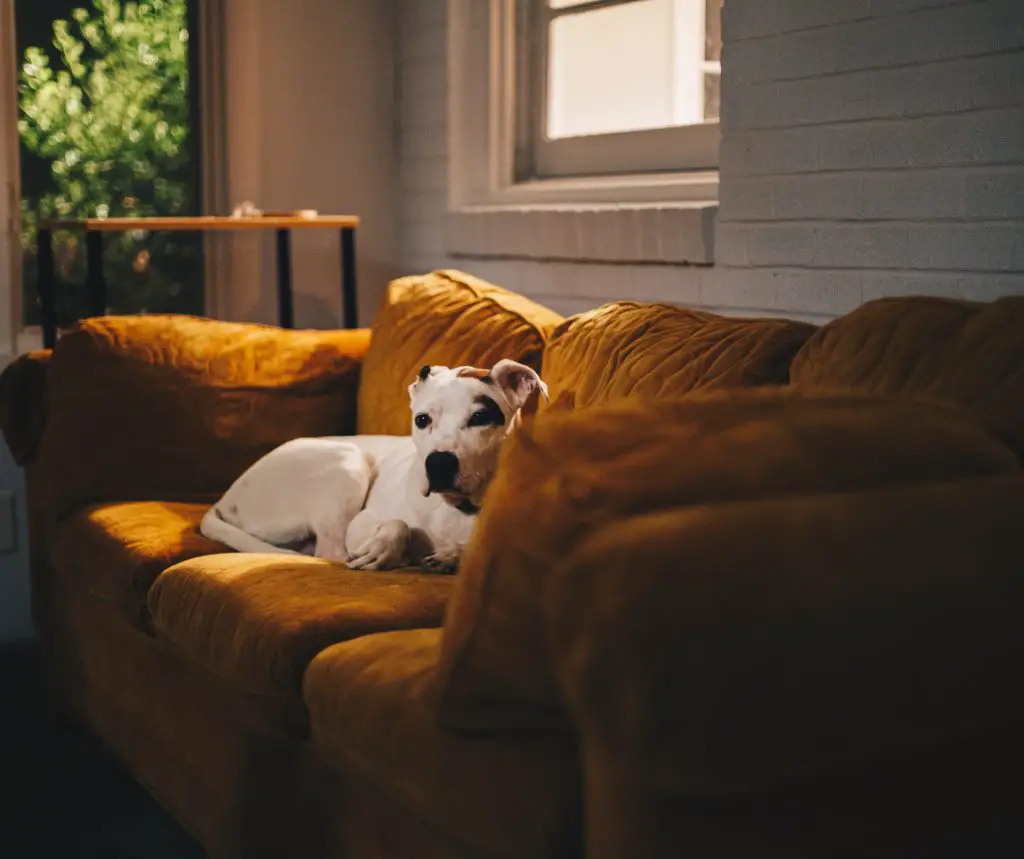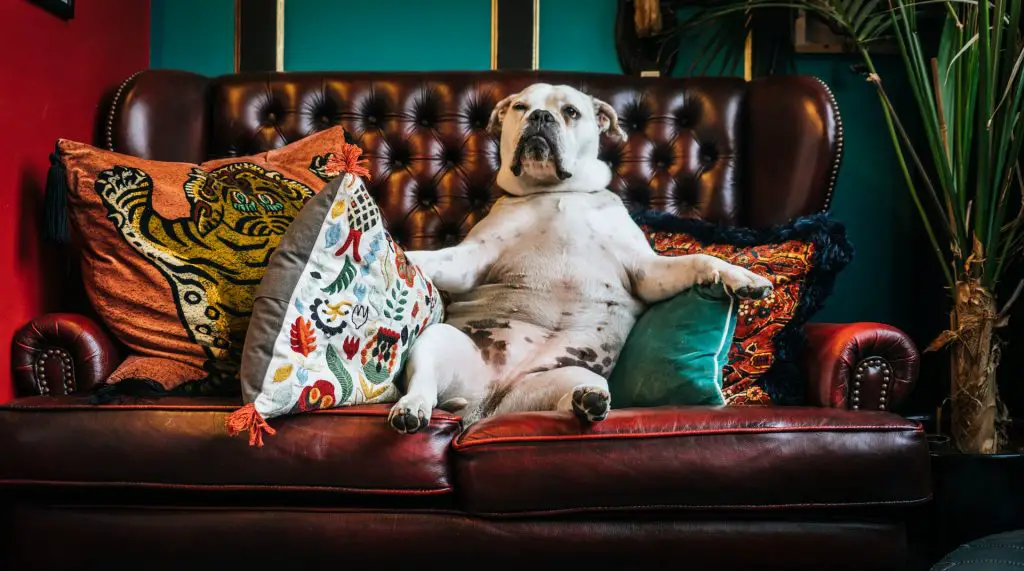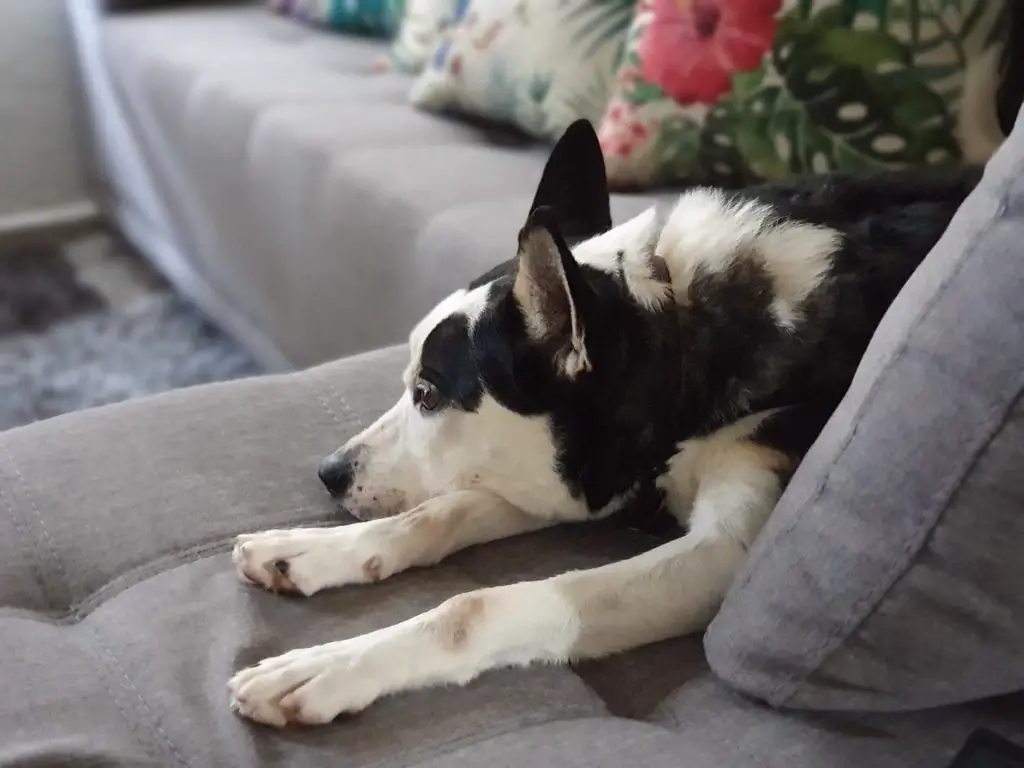With a bowl of popcorn in hand, you excitedly slumped into the couch to watch your favorite Netflix series. But instead of feeling the soft cushion, your butt is greeted with a puddle of dog pee. And then, the urine stink hit your nose. You can’t help but ask, why is my dog peeing on the couch? The answer to this can range from behavioral problems to serious medical conditions.
It’s easy to get angry and frustrated when your dog uses the couch as its bathroom. But before you lose your sanity, I encourage you to read on.
Why is my dog peeing on the couch?
There’s always a logical explanation why dogs do the things they do – including peeing on your couch. If you’re dealing with the same problem, the following might be the reasons why:
🐶Your dog isn’t properly housetrained.

Poor housetraining, or lack thereof, is the main reason why dogs pee on furniture. Your dog isn’t trained to hold it in and go outdoors to eliminate.
Remember that you shouldn’t allow your dog to access your couch until it’s fully housetrained. This will save you from cleaning up dog urine and feces on your prized furniture.
Housetraining is a process, so it may take weeks for a dog to master the craft. For breeds like French Bulldogs and English Bulldogs, you have to practice more patience. While these two dogs aren’t the hardest to potty train, they’re not the easiest either.
🐶Your dog is anxious.

Anxiety can get the best of any dog. Many uninformed pet owners see signs of anxiety as misbehaving, which prevents them from tackling the root cause of the problem.
Canine anxiety can be due to fear, aging, and separation from its pet owner. Fear-related anxiety can be triggered by loud sounds, the presence of strangers, and even a new scent. And due to extreme anxiety, scared dogs will fail to control their bladder.
On the other hand, aging dogs are also prone to anxiety due to cognitive decline. Canines suffering from cognitive dysfunction syndrome (CDS) will slowly forget about their potty training, among other things. This means they are more likely to pee on the couch.
Lastly, your dog might be suffering from separation anxiety, a condition present on about 14% of all canines. This condition will lead to accidents all over the house together with destructive behavior. Breeds like Golden Retriever, Border Collie, Poodle, and Pug have a high risk of developing this problem.
Remember that training is the only way to curb this behavior. Also, you have to match the right breed to your lifestyle so an anxiety-prone dog won’t be left alone at home.
🐶Your dog is marking its territory.

Another common reason why dogs pee on furniture is territorial marking. This is a prevalent issue among intact dogs, though female canines will also exhibit the same behavior.
Dogs do this to declare their ownership of the place. Your couch may be new, which makes your dog feel obliged to mark it. Sudden changes at home and the presence of other pets will also trigger the same reaction.
Take note that dogs communicate through the scent their bodies produce. With this, nothing beats the odor of their urine in sending the message to other canines. However, the same scent will be problematic if your dog marked your couch.
It’s not easy to tackle territorial marking since it’s ingrained in every dog’s genes. Still, neutering and training will go a long way in reducing the occurrence of this marking behavior.
🐶Your dog has urinary incontinence.

If your dog is properly housetrained, neutered/spayed, and calm, the signs point to urinary continence. Dogs that suffer from this condition have poor control over their bladder. It’s highly observed among older canines, but younger ones with an underlying condition can also experience incontinence.
Moreover, dogs with urinary tract infections, deformities, spinal injuries, and hormonal imbalances are likely to develop this urinary problem. Certain medications like corticosteroids will also cause this condition.
Canines with urinary incontinence will drip urine everywhere. You’ll also notice the dog licking its rear. It’s important to bring the dog to the vet as soon as possible for immediate diagnosis. Early detection of the condition will help curb complications, and it will increase your dog’s chance of full recovery.
How to stop your dog from peeing on the couch
I know how frustrating it is to find dog pee on the couch. It’s not easy to clean, and your dog will likely repeat it in the future if you don’t do something. To make sure that it won’t happen again, these tips will help:
✔️Clean up the accident
It’s important to clean the urine from the couch, so your dog won’t trace it back. However, wiping alone isn’t enough.
Even after we wipe the couch or blot the urine out, there will be remnants stuck within the cushion. Your dog’s keen sense of smell can easily pick this up. And before you know it, you have another dog pee to clean.
The key here is using an enzyme cleaner. Unlike typical household cleaners, an enzyme cleaner has live organisms that consume the urine’s remaining proteins. As they digest the traces of your dog’s pee, the smell will be gone permanently.
To use an enzyme cleaner, you first have to blot as much urine as you can get from the couch. After that, you can apply the enzyme cleaner and let it soak overnight. This will give the enzymes enough time to feed on the urine traces.
However, you should turn the lights on while applying this cleaner. The enzymes on this cleaning product are sensitive and will die if exposed to too much light.
✔️Consider spaying/neutering
You should also consider getting your dog neutered or spayed if it’s still unfixed. While fixing the dog won’t cure the problem, it will reduce territorial marking drastically.
It will also make your dog calmer and less prone to hormonal changes brought by pregnancy and mating. Aside from that, getting your dog fixed will help increase its lifespan.
✔️Brush up with potty training
It’s also important to refresh your dog’s housetraining. The first step is crate training the dog, so it will be compelled to hold its bladder for a specific period. Usually, adult dogs can hold their urine for up to 8 hours. Meanwhile, younger ones need to go frequently since their bladders are smaller.
Once you notice your dog sniffing, whining, barking, and pacing inside the crate, it’s a sign that he needs to go. Take the crate outside and open the door, so your dog can eliminate on its potty spot.
However, senior canines may not respond well to re-training, especially if they are already experiencing cognitive decline. In these cases, many pet owners use doggy diapers to prevent old dogs from peeing on the couch.
✔️Come up with a bathroom break schedule
Lastly, you should stick to a bathroom schedule for your dog. Canines are beings of habit, so they thrive in a set schedule. Basically, you need to schedule at least three bathroom breaks scattered in the morning, afternoon, and evening. Four to five trips will do for smaller breeds.
It’s best to schedule your dog’s first and last bathroom break 30 minutes after a full meal. Most dogs will have to go during these periods, which saves you from the guessing game of whether it’s time for your dog to go out.
✔️Eliminate the trigger
If your dog’s peeing accidents are anxiety-related, you have to identify and eliminate the triggers. It’s important to pay close attention to how your dog reacts when exposed to specific stimuli.
For example, does your dog tuck its tail when another dog arrives? Does it cower when there are strangers around?
If so, you’ll need to perform desensitization. This is a training process wherein you slowly help your dog associate the triggers into something positive. It’s like removing the fangs off their demons.
To succeed in trigger desensitization, you need to utilize positive reinforcement. You should reward your dog with treats and/or affection if it stays calm upon seeing the trigger. The key here is putting the trigger on a distance, then slowly inching close as your dog adjusts to it.
Frequently Asked Questions
Q: Why is my dog peeing a lot?
A: If your dog frequently urinates than it usually does, you should get it checked for metabolic diseases. Frequent urination in dogs is a general symptom of diabetes, kidney disease, and liver problems. On a less serious note, urinary tract infections can also lead to frequent urination.
Q: Do dogs pee in the house for attention?
A: No, your dog will not pee to get attention or out of spite. Canines will bark, steal things, and do other negative behavior to catch your attention. However, it’s very rare for dogs to pee on the couch just to piss you off. And if it happens frequently, there’s a very high chance that your dog is going through a health problem.
Q: How can you tell if your dog has a urinary infection?
A: Dogs with a urinary infection will urinate frequently and will strain while peeing. Affected dogs will also lick their genitals often, aside from the cloudy color of their urine. If you notice any of these on your pet, you should seek veterinary attention immediately.
Q: Will my dog’s UTI resolve on its own?
A: Most cases of canine UTI will not resolve on their own and will require veterinary care. Remember that putting off treatments for your dog’s condition will do more harm. Besides, urinary tract infection might be a secondary condition to a bigger health problem.
Q: Is there a spray to stop a dog from peeing inside?
A: You can try a dog deterrent spray, but this will only offer a temporary solution. These are citronella-scented sprays that dogs don’t like. You can spray it all over your couch, though some of these products may stain and give off a very strong odor.
Conclusion
Why is my dog peeing on the couch? It can be due to anxiety, poor housetraining, territorial marking, or a health problem. It’s important to address all these possibilities to stop your dog from peeing on your furniture.

